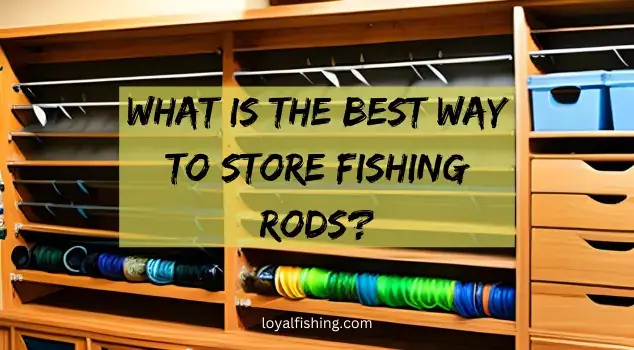What is the Best Way to Store Fishing Rods?

If you are an avid fisherman, you know how important it is to take good care of your equipment. One of the most crucial pieces of gear for any angler is their fishing rod.
However, when not in use, it can be challenging to keep them stored in a way that prevents damage and prolongs their lifespan.
In this article, we will discuss the best way to store fishing rods to ensure they remain in good condition and ready for your next fishing trip.
Why Proper Storage Matters?
Before we dive into the best ways to store your fishing rods, let’s first discuss why proper storage is so crucial.
Fishing rods are delicate instruments that are susceptible to damage, even from seemingly minor factors like temperature changes or moisture.
Exposure to sunlight or extreme temperatures can cause the material to warp, while moisture can lead to rust or other forms of damage.
Additionally, improper storage can cause the line to tangle, which can be frustrating and time-consuming to untangle, especially when you’re ready to cast a line.
Also Read: How to Store Fishing Rods in Car?
Best Way to Store Fishing Rods
To prevent these issues, it’s essential to store your fishing rods correctly. Here are some of the best ways to do so:
1. Use a Fishing Rod Rack
Fishing rod racks are an excellent way to store your fishing rods. They come in various sizes and styles, from wall-mounted to freestanding, and can be made from wood, plastic, or metal.
Using a rod rack allows you to store your fishing rods vertically, which can help prevent the warping or bending of the rod.
Additionally, rod racks usually have a system for holding the reel, which helps prevent the tangling of the line.
>>Check out Some of the Best Fishing Rod Racks<<
2. Use a Fishing Rod Case
If you prefer to keep your fishing rods stored horizontally, a fishing rod case may be the best option for you.
Fishing rod cases can be made from a variety of materials, including hard plastic or soft-sided fabric, and can be customized to fit the length and number of fishing rods you have.
They also provide excellent protection against moisture and temperature changes, which can help prevent rust or warping of the rod.
>>Check out Some of the Best Fishing Rod Cases<<
3. Store Your Fishing Rods in a Dry Place
No matter which storage method you choose, it’s essential to keep your fishing rods in a dry place.
Moisture is one of the biggest enemies of fishing rods and can cause rust, corrosion, and warping.
If you store your fishing rods in a damp area, such as a garage or basement, consider using a dehumidifier to keep the air dry.
Also Read: How To Store 2 Piece Fishing Rod?
4. Keep Your Fishing Rods in a Temperature-Controlled Area
Extreme temperature changes can also cause damage to your fishing rods.
For example, storing them in an unheated garage during the winter can cause the material to warp or crack.
Conversely, storing them in a hot attic during the summer can cause the material to become brittle.
If possible, store your fishing rods in a temperature-controlled area, such as a climate-controlled room or closet.
5. Store Your Fishing Rods Unstrung
When not in use, it’s best to store your fishing rods unstrung. Leaving the line on the reel can cause it to tangle, which can be frustrating and time-consuming to untangle.
Additionally, storing your fishing rods unstrung can help prevent the warping or bending of the rod.
6. Clean and Dry Your Fishing Rods Before Storing
Before storing your fishing rods, it’s essential to clean and dry them thoroughly. Use mild soap and water to clean the rod, paying special attention to the guides and reel seat.
Once clean, dry the rod with a towel and let it air dry completely before storing it. This will help prevent rust or other forms of damage that can occur if the rod is stored wet.
7. Store Your Fishing Rods Vertically
When storing your fishing rods, it’s best to store them vertically. This can help prevent warping or bending of the rod, which can occur if it’s stored horizontally or at an angle.
Additionally, storing your fishing rods vertically can help save space, as you can store more rods in a smaller area.
8. Use Rod Socks or Sleeves
If you are storing multiple fishing rods together, consider using rod socks or sleeves. These can help protect the rods from rubbing against each other, which can cause damage to the guides or reel seat.
Rod socks and sleeves are also an excellent way to keep your fishing rods organized and prevent tangles.
Also Read: Why Fishing Rods Are So Expensive?
9. Avoid Storing Your Fishing Rods in Direct Sunlight
Direct sunlight can cause damage to your fishing rods, including warping, fading, and cracking.
If possible, store your fishing rods in a shaded area or cover them with a protective cover. This will help prevent damage and prolong the lifespan of your fishing rods.
10. Avoid Overcrowding Your Storage Area
When storing your fishing rods, it’s important not to overcrowd the storage area. Overcrowding can cause the rods to rub against each other, which can cause damage to the guides or reel seat.
Additionally, overcrowding can make it difficult to access the fishing rods when you need them, which can be frustrating and time-consuming.
11. Store Your Fishing Rods with the Reel Facing Up
When storing your fishing rods, it’s best to store them with the reel facing up. This can help prevent damage to the reel, which can occur if it’s stored facing down.
Additionally, storing your fishing rods with the reel facing up can help prevent the tangling of the line.
12. Don’t Store Your Fishing Rods Against a Hard Surface
Storing your fishing rods against a hard surface, such as a wall or floor, can cause damage to the rod. The pressure from the hard surface can cause the material to warp or bend, which can be difficult to repair.
If possible, store your fishing rods away from hard surfaces or use a protective covering to prevent damage.
13. Keep Your Fishing Rods Organized
Keeping your fishing rods organized is essential for easy access and to prevent damage. Consider using labels or a color-coding system to keep track of your fishing rods.
Additionally, keep a log of the fishing rods you own, including the brand, model, and length, to make it easier to find the right rod for your next fishing trip.
Also Read: Types of Fishing Rods
14. Check Your Fishing Rods Regularly
Even with proper storage, fishing rods can still be susceptible to damage. It’s important to check your fishing rods regularly for any signs of damage, including warping, cracking, or rust.
If you notice any damage, address it immediately to prevent further damage and prolong the lifespan of your fishing rods.
15. Seek Professional Help for Repairs
If your fishing rod requires repairs, it’s essential to seek professional help. Attempting to repair a fishing rod on your own can cause further damage and may even render the rod unusable.
Seek out a reputable repair shop or contact the manufacturer for guidance on repairs.
Conclusion
So, at the end of the day of your fishing life, proper storage is essential for prolonging the lifespan of your fishing gear.
Whether you choose to use a fishing rod rack, case, or other storage methods, make sure to keep your fishing rods dry, store them in a temperature-controlled area, and keep them organized.
Regularly check your fishing rods for any signs of damage and seek professional help for repairs if necessary.
FAQs: People Also Asked
Can I store my fishing rods outside?
It’s not recommended to store your fishing rods outside, as exposure to the elements can cause damage to the rods. It’s best to store your fishing rods in a dry, temperature-controlled area.
Can I store my fishing rods in a garage?
Yes, you can store your fishing rods in a garage, as long as the area is dry and temperature-controlled. However, be sure to protect your fishing rods from any potential hazards, such as cars or heavy equipment.
Should I store my fishing rods vertically or horizontally?
It’s best to store your fishing rods vertically to prevent warping or bending of the rod. Additionally, storing your fishing rods vertically can help save space.
Can I store multiple fishing rods together?
Yes, you can store multiple fishing rods together. Consider using rod socks or sleeves to protect the rods from rubbing against each other.
How often should I check my fishing rods for damage?
It’s a good idea to check your fishing rods regularly for any signs of damage, such as warping, cracking, or rust. Check them before and after each fishing trip and at least once a year during storage.
